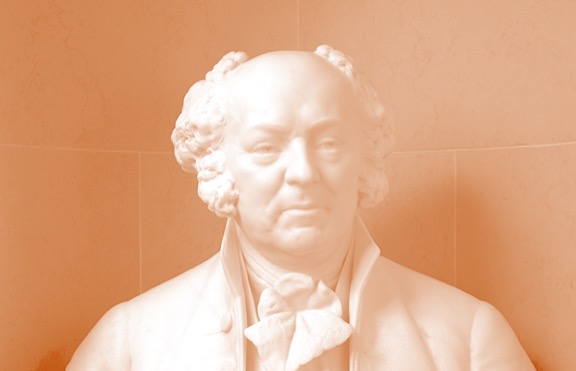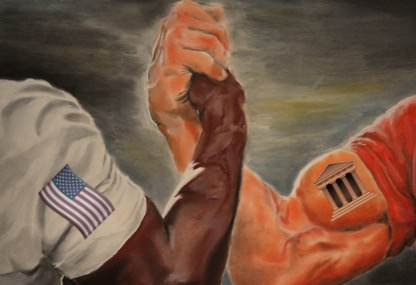Dead Conservative Memes Can’t Defeat the Identity Politics Clerisy

A new political vocabulary is needed for a world itself quite new.
The shock presidential election of 2016 might have prompted partisans on both sides to ask whether the vocabulary on which they relied had become a lifeless hindrance. On the Left, the Clinton political machine suffocated every dissenting voice within the Democratic Party, which denied its members the opportunity to rethink the identity politics death-grip that was strangling them. Then as now, Sanders, more smitten by Marx than the halfway-Nietzscheanism of identity politics, invited his fellow Democrats to step back from the brink. Alas, itself guilty of class privilege, the donor class of the Democratic Party living in Hollywood, Silicon Valley, and in the wealthy enclaves surrounding New York City needed a fig leaf to cover its class sins—and, so did not, and will not, allow Sanders to win the Democratic nomination and thereby reveal their unrighteousness.
The Democratic Party will again double down on the rhetoric of identity politics, lose the 2020 presidential election, and conclude—as it did with Russiagate—that some demonic force temporarily bent the arc of history in the wrong direction. The demonic force responsible this next time around? “Hate speech” from the lips of those in the center and on the Right who refuse to rehearse the Red Letter political liturgy identity politics tirelessly repeats—or bow before the false gods that identity politics worships.
Partisans on the Right were given a gift: President Trump. He came into the Republican Party, and the Republican Party understood him not. Many did not want to receive this gift. Having read their Aristotle and Burke, and wishing to remain gentlemen, they withdrew from the political fray—preferring the decorous tyranny of candidate Clinton, the very paragon of identity politics, to the incivility of candidate Trump who, alone among Republican candidates, had the temerity to combat it. “Our tastes, not our ideas, define us”—that is what the 2016 election apparently taught the GOP.
Now forming a Conservative Book Club of sorts, these gentlemen ponder great ideas, entice donors to fund their conferences and think tanks, and all the while enjoin us to believe the vocabulary of the pre-2016 Republican Party continues to be adequate to the troubles we face. It is not.
Today, whether at conservative conferences or in conservative think tanks, the listener even moderately attentive to the conversation will hear of the perils of progressivism and of cultural Marxism, of the need to defend family values, of the importance of being pro-life, of the importance of free markets, and of the threat of multiculturalism. These terms—indeed the constellation these terms form—emerged during the Reagan Presidency, more than three decades ago. If the 2016 Presidential election tells us anything, it is that this verbiage has hardened into nearly lifeless political rhetoric, sustained on life support through institutional buy-in and the assurances of political philosophers sympathetic to conservatism who tirelessly promote the link between the veritable ideas they study and the political vocabulary that has been in place for decades is timeless.
Times have changed, however. Philosophy must gently persuade; that is its privilege and its weakness. Philosophers are concerned with eternal truth. Partisans, by contrast, are concerned with timely rhetoric, opinion, and persuasion. They must engage in comparatively immediate combat. So long as conservatives inattentively conflate philosophizing and partisanship, they will continue to produce partisan vocabularies that masquerade as eternal truth—and partisans unable to respond in a timely manner to shifting times. To win, partisans must know when the weapons of their enemies have changed. Wars—and this is a crucial point to understand—are not won using weapons from earlier engagements. Only armchair soldiers and Conservative Book Club members have the luxury of replaying those battles.
.
The Enemy’s Weapon: Identity Politics
Neither liberals nor conservatives understand the weapon of identity politics, and the immense destruction it can cause. Identity politics does not simply parse different kinds of people. Identity politics is concerned with the relationship of transgression and innocence between different, purportedly monovalent, kinds of people. Identity politics is not just about who we are, it is about a moral stain or purity that defines who we are.
The language of stain and purity, of transgression and innocence, is Christian language. Other religions are concerned with these categories as well, but our long familiarity with Christianity in America means that the invocation of these categories by the practitioners of identity politics derives from Christianity, and from Protestantism in particular. Surveys may indicate that America has lost or is losing its religion; the fever of identity politics that now sweeps the nation suggests these surveys are looking in the wrong place and asking the wrong questions. America has not lost its religion. America has relocated its religion to the realm of politics.
Identity politics transforms politics. It turns politics into a religious venue of sacrificial offering. Ponder for a moment, Christianity. Without the sacrifice of the innocent Lamb of God, there would be no Christianity. Christ, the scapegoat, renders the impure pure—by taking upon Himself “the sins of the world.” By the purging of the scapegoat, those for whom He is the sacrificial offering purify themselves. Identity politics is a political version of this cleansing for groups rather than for individuals. The scapegoat in the case of identity politics is the white heterosexual male who, if purged, supposedly will restore and confirm the cleanliness of all other groups of communities. He is the transgressor; all others—women, blacks, Hispanics, LGBTQs—have their sins covered over by the scapegoat, just as the scapegoated Christ covered over the sins of all the descendants of Adam.
The theological perversity of replacing the Divine Scapegoat of Christianity with the all-too-mortal white heterosexual male scapegoat does not imply that he is innocent. Rather, in identity politics, the white heterosexual male becomes more than who he really is—a member of a scapegoated group who takes away the sins of the world, rather than a mortal, like everyone else, involved in transgression, and searching for redemption. The mystery of transgression and innocence, however, cannot be resolved at the level of groups, because in reality not one of them is univocally pure or stained. But identity politics stands or falls on the claim that groups are such unities of transgressors or innocents. Therein lies its weakness, at which all the armament allied against it must be aimed.
.
Why Identity Politics Emerged
Whatever your evaluation of his work, Nietzsche is our best guide to explain the emergence of identity politics. His conclusions may be repugnant, but his analysis is not. Pondering the future of the West in 1887, he wrote in The Genealogy of Morals that “it is the church and not its poison that offends us.” By this, he meant that in his own century and for the next several centuries, the West would neither quite renounce nor return to Christianity.
The recent appearance of identity politics in America and in Europe―the politics, but not the theology, of transgression and innocence―confirms Nietzsche’s prophecy. The disequilibrium of Christianity since the Enlightenment, combined with our inability to fully repudiate or fully embrace the religious inheritance of the West, has made it difficult for many Americans and Europeans to sleep well at night. Compounding their debilitation has been a twin development that could not have risen to prominence at a more inopportune moment. On both sides of the Atlantic, citizens are haunted by the historical wounds their nations have authored—in America, the wound of slavery; and in Europe, the wounds of Colonialism. At the very moment when these historical wounds highlighted the need to “make all things new” (Rev. 21:5), to what healing power could the transgressors appeal? More than a half-century after the echo of the wound of slavery reappeared in America—recall The Autobiography of Malcolm X—and the wound of Colonialism in Europe became fully visible—recall Franz Fanon’s The Wretched of the Earth—the answer given by identity politics is that no healing power whatsoever is available to the transgressors.
What of the aggrieved innocents? Because forgiveness has been banished, their portion is unyielding and unending rage. (In the feminist literature alone, last year saw the publication of Soraya Chemaly’s, Rage Becomes Her: The Power of Women’s Anger and Rebecca Traister’s, Good and Mad: The Revolutionary Power of Women’s Anger.) This volatile configuration without hope of resolution has unleashed the ancient Furies of Greek and Roman mythology, who indiscriminately punish all the parties identity politics has in its sights with madness.
Those enthralled by identity politics seek redemption by purging the uncleanliness they claim is external to themselves. The white heterosexual male is the first unclean transgressor in their sights; but because the innocence of those enthralled by identity politics must be purchased through the sacrifice of a transgressor, once he has been purged, another transgressor must be found. White women will be next, followed, I suspect, by “heteronormative” African-American men, whose endorsement of the generative family is not sufficiently “inclusive.” That will not be the end of it—nor can it be.
Identity politics must continue to expand the coterie of innocents whose “voices have not been heard,” who have been “marginalized,” or “excluded.” The politicization of the category “trans-gender” is therefore a necessary development of identity politics, irrespective of the small number of people who claim that identity category as their own. With all due respect to men and woman who struggle with anxiety and the essential strangeness of their world, Plato’s Republic long ago chronicled this problem, which, sadly for many today, can only be thought through in sexual terms.
Thinking far more capaciously, Plato suggested in the “Allegory of the Cave” that the seemingly familiar world of the prisoners is, for those who have eyes to see the Truth, a strange world. Pressing contemporary terminology into service, the shadowy world of the Cave is the cis-world, in which most feel at home. The philosopher, Plato writes, knows his home is elsewhere, and looks elsewhere to find it. Identity politics rules out Plato, however. Indeed, it rules out the whole of the history of Western political thought. Anxiety about the essential strangeness of the world must be caused by oppressive heteronormativity, which victimizes you, the innocent one.
So declares identity politics. The permanent victimhood of all the identity groups heretofore postulated has not been enough. More innocent identity groups are needed, to add to the chorus of voices that seeks to purge the Prime Transgressor so that their wounds may be healed and their innocence restored. In the world identity politics constructs, the scandal associated with the existing state of things must grow exponentially, and the indictments leveled at the world as it is must become ever more comprehensive. Once gay men and lesbians were among the voiceless innocents; transgender identity politics now relegates those gay men and lesbians who are cisgender—that is, comfortable with being natural men or women—among the transgressors.
We must be clear where this seemingly endless increase in the number of transgressors ends: It ends with the indictment of Man himself, for which the resolution will be either the embrace of transhumanism or the eradication of Man altogether.
In some quarters, these alternatives are already being given serious consideration. How petty our current identity politics scuffles must look from those quarters: we argue about who among us is righteous; they know that all traces of Man as we know him must be purged. (See Pascal Bruckner’s 2013 book The Fanaticism of the Apocalypse: Save the Earth, Punish Human Beings.) Echoing the Christian claim that is the font of identity politics, they know that either the soul of man conquers death or it suffers, as Paul wrote in his Epistle to the Romans, “the wages of sin,” which “is death.”
Christianity once offered redemption or damnation to Adam’s heirs. The final revelation of identity politics gives us transhumanism or human extinction; the one clears away Adam’s transgressive inheritance so that he may finally—literally—be “without blemish or spot” (1 Peter 1:18-19) and the other restores nature’s innocence by killing off the heirs of Adam altogether. What these two seemingly antithetical conditions have in common is the need for purity—be it redemptive or innocent.
Indeed, perhaps to wipe the stain away entirely, we would need to go further.
Following the logic of the argument, it is easy to foresee the revolutionaries of purity far outstrip Foucault’s “death of man” or Lewis’s “abolition of man,” with the species Homo only a surface manifestation of a far deeper blemish. The family, Hominidae, and the order, Primate, may not go deep enough either. Perhaps the class, Mammalia, gets us where we need to go. Look at the polar bear (a mammal); is he not the poster child for climate change? Mammals! They always have each other’s back. Perhaps the current era of mammalian dominance, which began after the Chicxulub asteroid wiped out the dinosaurs 66 million years ago, should come to an end. If man alone is purged, other mammals carrying the stain man has exhibited will arise. By eradicating man, we will not have eliminated the stain!
The good news, we must now confess, is that radical climate change could wipe out all mammals, after which a new class within the phylum Chordata will emerge―perhaps, reptiles? But here, too, we should be wary; what if the phylum Chordata is also implicated? “Creatures with backbones are not to be trusted. Eventually they grow upright, and full of themselves.” Nietzsche thought that all life involved the will to power. Perhaps he was right.
.
Escaping Rhetorical Obsolescence
The vocabulary liberals and conservative have on hand to fight identity politics is useless against the enemy as I have outlined it above. The progressivism of Croly’s The Promise of American Life did not propose to eradicate a theological stain. However ill-conceived, it sought to supplant citizen competence with state competence—to fulfill the promise of American life, not destroy it. The cultural Marxism of the Frankfurt School, as Martin Jay traced in his 1973 history The Dialectical Imagination, sought to undermine bourgeois prejudices so that the revolution might arrive and human alienation end. Yes, this is dreamy stuff, which authorized incalculable human suffering. Its hope, however, lay in a fully human world, not in the eradication of the stain that is man.
The old conservative language is not an adequate weapon or defense against such a theological opposition. Family values? Pro-life conservativism? Platitudes good for fund-raising but little else in the war against identity politics. What identity politics seeks to destroy is the generative family, which in its estimation caries the stain of man and all of his repulsive prejudices forward from one generation to the next. So, too, does tradition, which is not a precious inheritance by whose light we are guided, but rather a resume dripping with the blood of the innocents who have suffered so that others may uphold their inheritance.
Multiculturalism? Let us be generous. At its best, it is an extension of the pluralist claim that both the polity and the economy are well served when the vast array of interests are brought into the public square. At its worst, multiculturalism amounts to a facile claim—perhaps even a resentful claim—about the equality of all interests, a development Tocqueville anticipated already in Democracy in America, in 1840.
Multiculturalism pales in comparison to identity politics, which shouts down all public speech that stained transgressors might utter. Emblematic of this demand for recognition by innocent victims is the exchange chronicled on the Yale University courtyard, on November 15, 2015—and the more recent events described by Michael Brendan Dougherty as rituals in “The Church of Grievance.”
The defense of free markets? Identity politics relentlessly attacks the idea that the moneyed ledger that accountants keep can touch the deeper problem of moral or spiritual debt, which no amount of money can repay. If you are a white heterosexual man, not even the wealth of King Midas can redeem you—though you will be given to understand that through your commitment to Woke Capitalism, the cause of Climate Change, etc., you can be lifted from the inferno of hell and relocated to the purgatory that being on The Watch List entails.
Identity politics must be confronted head on. The yesteryear vocabulary liberals and conservatives use today is inadequate to fight the battle at hand squarely. Identity politics is an American awakening, without God, and without forgiveness. The Christian categories of transgression and innocence have irrupted into politics—a development that has overshadowed the need for citizen competence of the sort that our commercial middle-class regime requires—the competence of self-government, of stewardship, of work and industriousness, of business ownership, of fatherhood and motherhood, and on and on.
Isolated citizens may be content hiding behind their “identities,” but we can only build a world together through competence. There is ample evidence that identity politics has left its parishioners isolated and alone—and despite episodic righteousness, very unhappy. Let us remind our fellow citizens that it is time to build a world together again. In our families, our civic associations, our local governments, and our modest commercial enterprises, we can do just that. Let us also remind our fellow citizens that the precondition of this renewed engagement is the understanding that there are no monovalent identity groups who owe or who are owed. We cannot confront each other as tribes who are either stained or pure, but as citizens engaged in a common enterprise.
The 2016 presidential election cycle gave us a hopeful sign: Americans narrowly indicated that they have had enough of the derogation of competence and the elevation of innocence. Liberals and conservatives concerned about the American regime must now do all they can to defend the politics of competence, and relentlessly aim their munitions at the religious idea that the Christian categories of transgression and innocence can be invoked in politics to redeem the world. ![]()
The American Mind presents a range of perspectives. Views are writers’ own and do not necessarily represent those of The Claremont Institute.
The American Mind is a publication of the Claremont Institute, a non-profit 501(c)(3) organization, dedicated to restoring the principles of the American Founding to their rightful, preeminent authority in our national life. Interested in supporting our work? Gifts to the Claremont Institute are tax-deductible.
Part I: Unfettered reason cannot conserve anything.
Part II: Honor and self-constraint can stave off tyranny.






